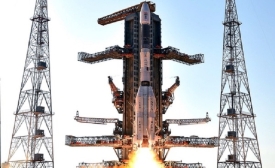bhutan
Bhutan was never going to be an early adopter. It is a small and remote place — a little more than twice the size of Los Angeles and Orange counties combined, perched at the eastern edge of the world’s highest mountain range. The Buddhist constitutional monarchy, however, is steadily moving into the modern era, even as its 800,000 people struggle with how much of it to embrace.

Madhurjya Kotoky discusses the importance of India's new endeavor into space diplomacy.
Aug. 26-28, Bhutan will celebrate its seventh Mountain Echoes Literary Festival. The three-day festival is uniquely set against the backdrop of the verdant Himalayas in Thimphu, the capital of Bhutan. Mountain Echoes is a confluence of art, music, literature and new media, serving as the ideal platform for debate, discussion, and cultural exchange.
The latest spate of terrorist attacks in the Middle East and Bangladesh and the unfortunate, indiscriminate killings in Paris have highlighted how misinterpretation of culture, rituals and religious beliefs are affecting peace and stability all over the world. It has also drawn attention to the politicisation of faith and its consequent repercussions. [...] This process [of cultural diplomacy] is reducing the impact of differences in cultures becoming catalyst for conflict.
India today proposed new ideas for further enhancing cooperation with Bhutan while asserting that commitments made by the previous government will be fulfilled. External Affairs Minister Sushma Swaraj, who is accompanying Prime Minister Narendra Modi to Bhutan on his maiden foreign visit, told reporters here that the Indian side was "extremely satisfied" with the "extremely successful" visit. Swaraj said Prime Minister Modi gave some new suggestions to Bhutan.
Bhutan was the world’s last hold-out against television and is regarded by travelers as a Himalayan Shangri-La. But Bhutan’s decision to make itself the poster boy for electric transport is further proof of its willingness to embrace technology as part of its unique Gross National Happiness development model, says its prime minister.
As an aide to the prime minister of Bhutan, Takao Takahashi helped deepen people’s understanding of the need to manage their money in the rapidly growing South Asian country valuing “gross national happiness.” The 31-year-old, who now works for the World Bank in Washington, said that although Bhutan’s consumption is surging amid rapid economic growth, its people have little knowledge about how to manage their money.







